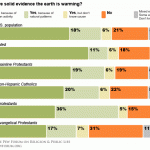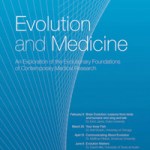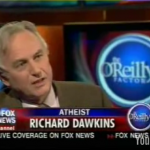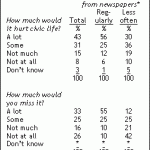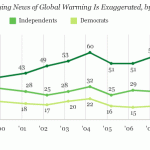
Pew has a detailed run down on the surge in motivation for information about swine flu. The brief analysis goes on to discuss strategies CDC had put in place to be ready to "pull" audiences in when an infectious disease outbreak occurred:
The prominent position of the CDC on these lists may be owing in substantial part to the government's earlier recognition of the usefulness of Google search tools in tracking the actual spread of diseases. Google's Flu Trends tracks certain search terms to estimate possible flu activity at a state level - and it does this far more quickly than the CDC's…
The Global Language Institute has started a new index that ranks universities by number of media mentions. Below is their top ten universities.
I have a few reservations and cautions about the significance of these rankings. At one level, having comparative benchmarks that provide at least some data about the media profile of the research conducted at universities is better than no data at all. However, there is the risk that these ranking reinforce the marketing and publicity trend among research universities, with science joining athletics as a part of the competitive branding of the…
That's the revealing thesis of a new book reviewed at New York magazine, examining the disconnect between the reality of the Columbine shootings and the many false media reports and explanations for the tragedy.
The International Journal of Sustainability Communication is an important new open-access outlet for research and practitioner essays on environmental communication. In the latest issue, communication strategist Tom Bowman suggests that the workplace has been overlooked as a central place to engage Americans on climate change:
How can communicators engage the public in social learning and dialogue? The most obvious answer is to focus on places where social interactions already occur and where
groups of people would be predisposed to form new collective narratives and social norms.
The…
Earlier this month, I was honored to give a lecture co-sponsored by the NIH and National Academies at their historic downtown DC headquarters. The focus of the talk was on "Communicating about Evolution," part of a spring lecture series on evolution and medicine.
The video and the slides for the presentation are now online and include closed-captioning. I gave a similar presentation this past weekend in Pittsburgh at the Council of Science Editors' meetings. The presentation runs about 45 minutes with 30 minutes of Q&A.
For readers of this blog and followers of the "Framing Science"…
I'm back to the blog after a few weeks off. It's been busy to say the least, with most of my time spent submitting an NIH proposal as part of the stimulus grants program. (More to come on the focus and topic.)
In any case, look for a regular 10 or so posts a week here at Framing Science. My plan over the summer is to highlight much of the exciting new research in the field of science communication that has appeared recently in the journals or that may be coming out. I also have several forthcoming articles that propose a series of innovations in science communication that are likely to be…
Next week I am excited to be participating in a unique conference organized by the Cary Institute for Ecosystem Studies. The Institute is bringing together top scientists, journalists, policy experts, and communication researchers to focus on "Effective Communication of Science in Environmental Controversies" with a series of symposia articles to be produced based on the presentations. Headliners include the NY Times' Andrew Revkin and Nature columnist David Goldston.
At the conference I will be presenting on new models for science and environmental journalism, a topic very much top of mind…
Just how important is it to engage religious audiences on climate change? As a newly released Pew analysis indicates (above) there is not much variation in climate perceptions across religious affiliation. Most notably, among Evangelicals, a plurality or 34% believe that global warming is happening and is due to human activities. Moreover, the gap between Evangelicals and the religiously unaffiliated on acceptance of human-induced global warming is only roughly 20%.
Considering that the gap on the same question between college educated Republicans and college educated Democrats is a striking…
Roughly 100 audience members turned out to Monday's talk at the National Academies on "Communicating about Evolution" co-sponsored by the NIH and part of their spring lecture series on Evolution and Medicine. Online video of the talk and slides will be available soon but below I have pasted the take home conclusions that I offered, principles and rules of thumb that should guide public engagement not just on evolution but on any science-related policy topic.
1. Science literacy has very little to do with public support, trust, perceptions, or deference to science.
2. Scientific organizations…
For DC readers, as part of a spring lecture series on evolution and medicine sponsored by NIH and the National Academies, I will be speaking tonight at 7pm at the National Academy of Sciences Auditorium at 2101 Constitution Avenue, NW (adjacent to the State Department and National Mall.) Go here for more information on the free talk.
The topic of the lecture is "Communicating about Evolution" and I will be discussing themes covered in recent articles and forthcoming book chapters. I previewed some of these themes in video interview segments last year with Big Think.
Here is a synopsis from…
Readers of this blog should find the arguments in Tom Friedman's column today familiar. On climate change, Friedman argues that it's time to switch focus from cap and trade to a carbon tax, a policy that most Americans can understand.
But switching policy is not enough, you also have to switch the frame from a dominant focus on impending catastrophe to a focus on economic development or "American renewal." Here's how Friedman explains this economic development frame:
We need a price on carbon because it will stimulate massive innovation in the next great global industry -- E.T. -- energy…
Obama Girl, the viral video vixen, is creating buzz again, this time as part of a coordinated public engagement campaign on energy and climate change. Check out the rap video above and then go over to The Energy Collective where Mark Gunther has the details and an audio interview with the campaign's creators at Smart Power.
This week's NY Times magazine runs a cover story by Nicholas Dawidoff on Freeman Dyson and his doubts about the urgency of climate change. Many critics have decried the article as another leading example of false journalistic balance.
Yet I think there are much deeper issues at play here. On one hand, the social scientist in me views Dawidoff's journalistic narrative as a sociologically nuanced take on what happens when policy debates are simplistically reduced down to a matter of "sound science" and "inconvenient truths" rather than decisions involving values and trade-offs. On the other…
For those unable to attend next week's talk at the NASA Goddard Space Flight Center, there is a call in number to listen to the presentation and discussion. See details on the talk here. Audio will also follow online.
Also if you are a non-NASA staff member and would like to attend, here are the details. Leave a comment in the space below and I will email you back with the staff contact information:
[Non-staff] will need to contact me at least a day ahead of time so that I can let security know how many people to expect. I'll need a couple of days for foreign nationals, since I'd have to get…
For readers in Denmark, Sweden, and Germany intrigued by the discussion over the past few days at Scienceblogs, the Danish Association of Science Journalists will be focusing on these exact same topics at their upcoming June meetings. Register at the site and see an agenda of speakers, with the roster not quite yet completed. At the conference, I will be giving a morning talk and participating in an afternoon panel discussion.
See below from the conference description on the relevance of framing to science communication:
For science journalists and the media in general, some important…
On April 8 at noon, I will be giving a talk on climate change communication at the NASA Goddard Space Flight Center in Greenbelt, MD. Below are the details. The talk is open to all NASA staff as well as the public.
Communicating Climate Change: Why Frames Matter to Public Engagement
Bldg 8, Management Conference Center
Time: 12:00 PM
Building broad based public engagement on climate change requires a more careful understanding of the U.S. public's views on the issue as well as a reexamination of the assumptions that have traditionally informed public communication efforts. In this…
When pundits like Richard Dawkins use the trust and authority granted them as scientists to denigrate religious publics, is it unethical?
On issues such as climate change, nanotechnology, and evolution, research in the area of framing is being used to design and plan communication initiatives and to craft novel, accessible, and relevant narratives for nontraditional audiences across media formats. The intended outcomes include increased learning, dialogue, and public participation.
Yet what's still missing is a clear outline of the ethical and normative imperatives that apply to scientists,…
The struggles of the science beat at local newspapers have little or nothing to do with scientific illiteracy or public respect for science and much more to do with the economic climate and a more general and profound absence of public appreciation for the role of the press in civic life. Consider this stark finding from a just released Pew report: Less than a majority of Americans believe that the loss of their local newspaper would critically harm the health of their community.
So what's going on here? Science has been and remains the dominant force in American culture. Research shows that…
Next week on Thursday at noon I will be in Edmonton, Canada delivering the annual Picard Lecture at the University of Alberta's Health Law Institute. More information on the presentation "Science Communication at a Crossroads: Promising Directions, Lingering Distractions" can be found here. The lecture follows similar themes that I addressed in a presentation late last year at the New York Academy of Sciences.
A Gallup survey report released yesterday finds that a record 41% of Americans--and 66% of Republicans--now say that news reports of climate change are exaggerated. I first spotted this troubling trend in a 2007 paper analyzing twenty years of public opinion about climate change. This latest survey reinforces my fear that climate advocates have fallen into a dangerous communication trap.
At the root of this growing perception is something I blogged about earlier this week: As long as science is communicated as the principal reason compelling policy action--and this "compelling" science…
